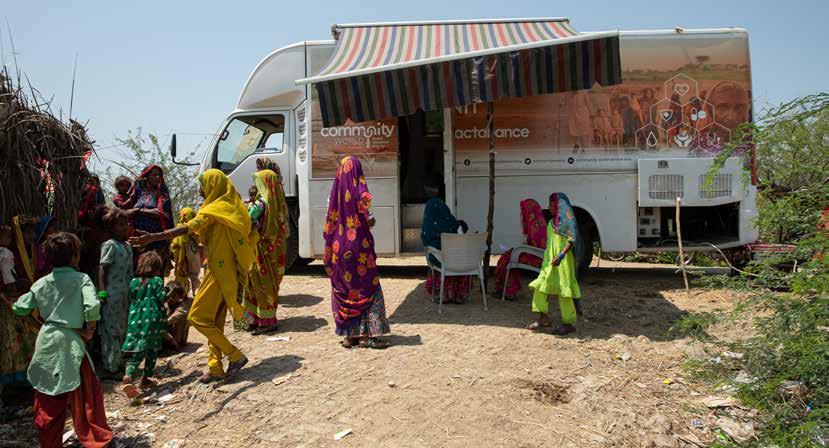
12 minute read
IMPROVING HUMANITARIAN PROGRAMME DELIVERY
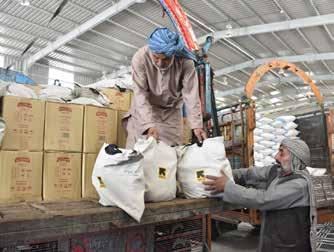
The DEC is committed to using learning from emergency responses to ensure that funds are used appropriately and that programmes meet the highest standards. This aims to ensure that the needs of people affected by disasters are met effectively whilst respecting their dignity. The following sections identify some of the best practice used by DEC member charities in Pakistan to meet this commitment.
Being accountable to communities
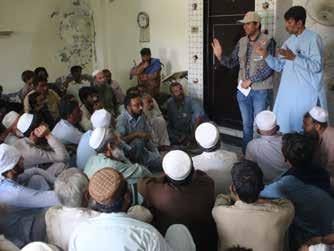
bridges, hindered access to people in need of assistance. The transportation of relief goods to the most remote communities took longer than expected. DEC member charities and their partners have had to be agile in adapting to the conditions, for example mobilising boats in order to reach people in need, using volunteers to deliver supplies direct to families who cannot reach distribution points, and setting up mobile health units to take services direct to the communities that need them.
Political and economic instability during the response. Due to a restriction on some imports, there was a shortage of raw materials for pharmaceuticals, which caused challenges in procurement of medicines, medical supplies and equipment. Inflation on imported goods was also an issue, making it difficult to procure commodities like construction items, medicines, dignity kits and solar lamps. DEC member charities mitigated these challenges with existing framework agreements with suppliers or Master Purchase Agreements already available for certain items.
Provision of timely multi-purpose cash assistance to vulnerable households. Whilst cash-based programming was an effective means of providing assistance to vulnerable people, its implementation was complex due to multiple reasons, such as lost or expired computerised national identity cards (CNICs), a lack of physical cash in some remote areas and poor mobile connection. To overcome some of these issues, member charities offered alternative arrangements, including by providing an electronic cash transfer ID to recipients to enable payments to be made through other verified and trusted family members.
To ensure accountability to the affected population and ensure that programmes were meeting their needs, DEC member charities and their local partners continuously engaged the communities they were working with throughout the project cycle, including through rapid needs assessments, project design, implementation, monitoring, and learning workshops. Introduction meetings and focus group discussions were set up with community members – women, men, children, marginalised groups, older people, and community leaders – to explain the project objectives, the types of assistance that would be offered, the criteria for selecting people who would benefit, the required behaviour of staff and volunteers and the main donors.
DEC member charities and their partners put in place multiple feedback mechanisms that were designed to be accessible to all community members. During project initiation meetings, communities were able to feed into the design of these mechanisms. The mechanisms used during the programme included:
■ Community meetings where space was given for feedback and complaints to be made including the display of banners and distribution of flyers,
■ Feedback boxes placed in accessible locations
■ Helpline numbers and email addresses printed on information, education, and communication materials, tokens or cards, and relief item packaging
■ Face-to-face feedback collection sessions
■ Post distribution monitoring
■ Focus group discussions following distributions
An example of feedback came when a local partner of a DEC member charity received feedback from some beneficiaries with impairments who said that they were unable to get to distribution sites and did not have money for transportation. Based on their feedback, transportation of agricultural inputs to the homes or fields of these beneficiaries was provided.
Including people with specific needs
Aligned with the vulnerable household categories mentioned in Pakistan’s Joint Flood Response Plan10 of the Government of Pakistan and the UN, DEC member agencies had lost their income and livelihoods, and in particular female-headed households, widows, households including pregnant and breastfeeding women, people with disabilities, older people, and ethnic and religious minorities.
Projects were adapted to meet their needs, for example by designing specific vulnerability criteria for each intervention, providing wheelchairs at the temporary health posts or having latrines wide enough for a wheelchair to access the toilet. Childfriendly spaces and temporary learning centres, mobile clinics and health posts were also made accessible for people with disabilities, including through the provision of ramps. The response addressed gender concerns through various strategies, including the promotion of gender sensitivity among health service providers, bringing focus on vulnerable and disadvantaged women to improve their health status, and ensuring that women, men, girls, and boys had equal opportunity and access to preventive and curative services. Hygiene kits were gender specific, including sanitary products for women.
Women have also been included in community support forums or committees to maximise their participation in decision-making. DEC members and their partners hired local female social mobilisers and doctors who speak the language and understand the culture.
© HelpAge International
Supporting a locally led response
A total of 23 local partners were involved in the DEC-funded response, along with local authorities and numerous existing community-based organisations (CBOs). DEC member charities focused efforts on providing support and training to strengthen their partners’ abilities to deliver humanitarian aid efficiently. The training covered issues such as safeguarding, humanitarian standards, procurement procedures, community engagement, accountability (including feedback mechanisms), protection, gender and inclusion, and monitoring and evaluation. Furthermore, partners are supported by DEC member charities’ technical staff in all the relevant sectors (Health, Protection, Cash Assistance and so on) through regular mentoring sessions online or at project locations. However, the DEC-commissioned Real-Time Review found that more time and resources should be invested in CBOs, such as village committees, to strengthen their capacities and give them stronger responsibilities in their recovery process. This recommendation has been taken into consideration in the recovery phase of programming.
District Government departments, including Education, Social Welfare and Health were engaged in project implementation and were directly involved in different activities such as community meetings, field visits, and training. For example, technical training was organised for District Health Department staff to improve the quality of health services and local authorities were also involved in monitoring visits to some of the activities.
Some projects are also being handed over to District Governments when they end where appropriate. For example, one DEC member charity is handing over temporary learning centres to the District Education Departments in June 2023 to ensure continuity and their continued use in government schools.
All local partners already had a presence in their areas of intervention prior to the floods and had already built trust within the communities. This experience facilitated inclusion and participation of local actors, village committees, Water Management Committees (WMCs) and other CBOs during planning, implementation and monitoring of project interventions. This appropriation by CBOs ensured that results are sustainable and that local populations were better equipped to deal with future crisis situations themselves.
Duty of care to staff
DEC member charities recognise that they have a duty of care to all their staff and to all their local partner staff working in this emergency response and have developed different activities to support staff, including:
■ Ensuring that staff are trained on how to prevent, mitigate, and respond to security incidents and respect security policies and plans.
■ Giving access to staff counselling to support the psychosocial wellbeing of the staff and a referral system to further support if needed.
■ Providing training to support personal resilience.
■ Providing awareness to team leaders to ensure that best practices in staff care are utilised to support staff and their families.
■ Overseeing staff health and worksite health and safety policies and services.
■ Encouraging local partners to nominate duty of care focal points and train them on staff wellbeing.
Safeguarding
All DEC member charities have robust safeguarding policies in place with zero tolerance of incidents of violence or abuse against children and other people in the communities they serve.
All DEC member charities have worked on strengthening their local partners’ internal processes and systems towards ensuring safeguarding measures are in place for the operations. Partner staff were trained on how to handle confidential safeguarding reports sensitively.
As part of the orientation process, all new staff and new partner staff were trained on safeguarding and signed the relevant Code of Conduct. Member charities organised regular training workshops and review meetings that provide staff with opportunities to enhance their knowledge and skills in humanitarian practice. Further to this, all member charities have a whistleblowing policy that provides guidance on reporting unacceptable behaviour and investigation procedures and processes.
To create a safe and supportive environment for the affected communities they serve, all projects were planned with careful consideration of ‘do no harm’ principles and the protection and safety of the beneficiaries including:
■ Consideration of local social cohesion and dynamics by engaging the community in the selection of aid recipients and ensuring that they understand the selection criteria.
■ Feedback mechanisms to ensure that any activities that cause concern for aid recipients can be highlighted in a timely way and addressed.
■ Consideration of protection concerns in new installations such as collective toilets and child friendly spaces.
■ Close monitoring and adaptability in terms of security considerations.
■ Consultation with communities to ensure that the timing of distributions and other work do not pose any unnecessary risk for the participants.
The DEC-commissioned Real-Time Review found that all member charities have detailed policies on safeguarding communities against sexual and physical harm and these were wellcommunicated to communities during meetings and through banners. All DEC member charities also employed complaint mechanisms to give communities multiple avenues for flagging such abuse.
Protecting the environment
DEC member charities are aware and conscious of the risks of potential environmental damage through their responses and mitigated them in a variety of ways, for example by procuring reusable or recyclable items in the hygiene, dignity and shelter kits that they delivered or by developing comprehensive systems of health waste management, from the generation of waste to its disposal. Another focus was on community awareness of the environmental impacts of waste disposal.
Some member charities prioritised virtual monitoring via video calls to reduce the carbon footprint of travel and held meetings online when appropriate. All member charities prioritised local suppliers in procurement processes to reduce carbon emissions due to transportation. Fertilisers used in the agricultural inputs were selected to minimise groundwater contamination or pollution.
Nature-based solutions and build-back-better approaches were implemented by some DEC member charities to protect people, property and infrastructure from future hazards. This included the construction of walls to contain flood- and rainwater so that it can be used for the cultivation of crops, and avoid erosion of the fertile soil layer for agricultural land, as well as the organisation of a tree planting campaign in February 2023 which mobilised young people from local villages.
The DEC commissioned a study by the London School of Economics to compare nature-based solutions in the DEC 2010 and 2022 Pakistan Floods Appeals. The study will provide DEC member charities with a guide to best practice in environmental flood response and recovery.
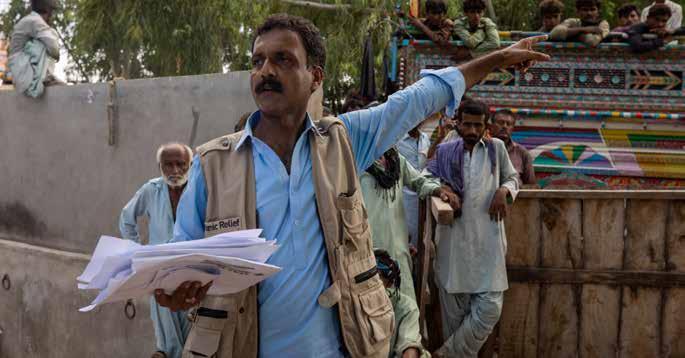
Adaptive programming
The DEC puts flexibility at the heart of its approach to funding disaster responses, allowing member charities to adjust their planned activities quickly when circumstances change.
Member charities monitored the broader context in which they were working and shared regular updates to aid designing, adapting, and delivering relevant humanitarian programmes. When new needs were identified they adjusted their programming to ensure communities were supported in the best possible way. For example, during a Rapid Need Assessment in November 2022, winterisation kits containing blankets and warm clothing were identified as an immediate need. As a result, a DEC member charity increased its budget for the first six months to support this additional activity. In October 2022, a DEC member charity identified that food needs were higher than anticipated and were able to adjust their plans to support an additional 2,000 households in Sindh province with food rations. Plans were also adapted following feedback from one local partner who reported a high number of acute malnutrition cases and a shortage of medicines and nutrition supplies in some health facilities. In response, six health facilities received ready-to-use therapeutic food, providing treatment for 1,756 malnourished children.
However, the Real-Time Review conducted in March-April 2023 found that member charities could have adapted faster as the situation in communities changed rapidly during the early phase of the response.
Monitoring, evaluation and learning
The DEC has developed an effective accountability framework to monitor the progress of its member charities, to make adjustments if needed and evaluate the outcomes and the impacts of the response on the affected population.
All 11 DEC member charities and their local partners responding in Pakistan have strong monitoring systems in place including orientation meetings with the local partners and the communities, needs assessments, monitoring and evaluation plans, indicator tracking tools, digital data collection applications, post distribution monitoring surveys, field visits, feedback meetings with beneficiaries, learning meetings as well as reporting project achievements (progress, plans, and challenges) to the beneficiaries, the Government authorities and DEC.
These systems ensured the participation of communities and facilitated joint monitoring missions by engaging all the direct stakeholders to ensure the quality of project implementation and create ownership among all the direct stakeholders.
The DEC secretariat is also committed to making continual improvements and therefore the Pakistan Flood Appeal 2022 response has been built on learning from the 2010 Pakistan Floods.11 As usual, the DEC commissioned a Real-Time Review of the DEC-funded response to this disaster to capture learnings and make recommendations to improve ongoing programmes. Data collection took place in February and March 2023 and involved household surveys, focus group discussions, and key informant interviews. The review found that the first six months of the flood response (Phase 1) has been relevant, efficient, and effective. Members were able to successfully respond to the immediate needs of communities, mostly related to shelter and food and water, based on the findings of coordinated needs assessments. Coupled with this, DEC member charities demonstrated a strong commitment to accountability to affected populations, through various mechanisms, such as village committees and feedback mechanisms. The review also provided several recommendations for how programming could be strengthened in future. These included improving coordination among DEC member charities to encourage collaboration and knowledge sharing; providing more support and granting more autonomy to local partners; and, improving the monitoring of community needs as they change over time, including those of more marginalised groups within the affected population. These recommendations have been shared with DEC member charities and their partners, and, in several cases, have already been taken into consideration in the implementation of Phase 2 of the response.
The DEC secretariat is also committed to making continual improvements and therefore the Pakistan Flood Appeal 2022 response has been built on learning from the 2010 Pakistan Floods. The Real Time review concluded that learning from the 2010 floods had been applied but the long time gap since the previous floods meant some institutional memory and capacity had diminished. Communities in Pakistan generally reported that agencies had made efforts to learn from their knowledge and experiences.
Recommendation from DEC Pakistan Floods 2010 Real-Time Review Extent to which they have been applied in 2022 floods
Provide winter clothing and return packages in Sindh DEC member agencies and partners are providing this assistance in Sindh and other provinces
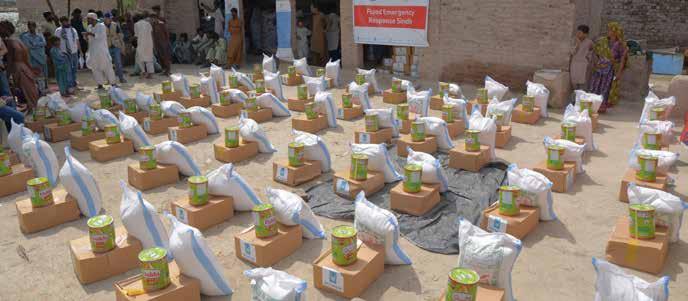
Enhance the use of and build local capacity strategically There has been major progress in the use of local partners and Pakistani staff. Agencies must now focus on greater support to local partners
Develop clearer criteria for targeting of affected groups and villages
Develop interventions in villages based on people’s priorities/ needs
There was more accurate and transparent targeting of aid in the 2022 response
There was much greater participation of communities in this response
Enhance coordination with other stakeholders Coordination issues were more challenging in 2022 as the normal cluster system was not activated.
Engage more proactively with women and other vulnerable groups to enhance protection
Develop clearer communication strategies to enhance transparency and awareness
Undertake advocacy on critical issues
There was greater involvement of women and other vulnerable groups in this response
Agencies used stronger compliant systems
The context in Pakistan has meant that advocacy on key needs has become harder to do.
Facilitate DRR/preparedness at local and regional levels Agencies had implemented large DRR programmes after the 2010 floods although their efficacy had reduced due to the long time gap and few of the DRR community groups established in 2010 are active.
Enhance the documentation and dissemination of lessons learnt
Coordinating the humanitarian response
The Government of Pakistan leads the flood emergency response operation coordinated by the National Disaster Management Authority (NDMA), Province Disaster Management Authorities (PDMAs), and District Disaster Management Authorities (DDMAs).
All DEC member charities and their partners maintained good coordination with these government departments. This collaboration was critical to granting access permission and ensure that activities complemented the government response and avoiding duplication of efforts.
DEC member charities and their local partners are also members of the Pakistan Humanitarian Forum and/or the National Humanitarian Network and play an active role in sectoral working groups such as Health and Nutrition, Education, Food Security & Livelihood, Protection, Water, Sanitation and Hygiene, Shelter & Non-Food Items, Cash Learning working groups at the national and local levels.
In addition to the PDMAs and DDMAs, at the provincial and district levels, member charities and their local partners established strong linkages and an effective coordination mechanism with government line departments, for example social welfare, education, agriculture, public health and engineering and livestock departments, and district administrations. Supporting and strengthening, where possible, existing public services to be part of the response is a key factor in the sustainability of the response and ensuring better preparedness for future emergencies.
The emphasis on learning is much higher in the 2022 response than the 2010 response with all agencies holding learning events.
Finally, all DEC member charities shared their plans amongst themselves including geographical areas of intervention, type of proposed activities, local implementation partners, and compliance with government procedures related to access and priority areas for humanitarian interventions. This synergy between member charities helps to reduce costs, to increase efficiency, and to promote good practice.










